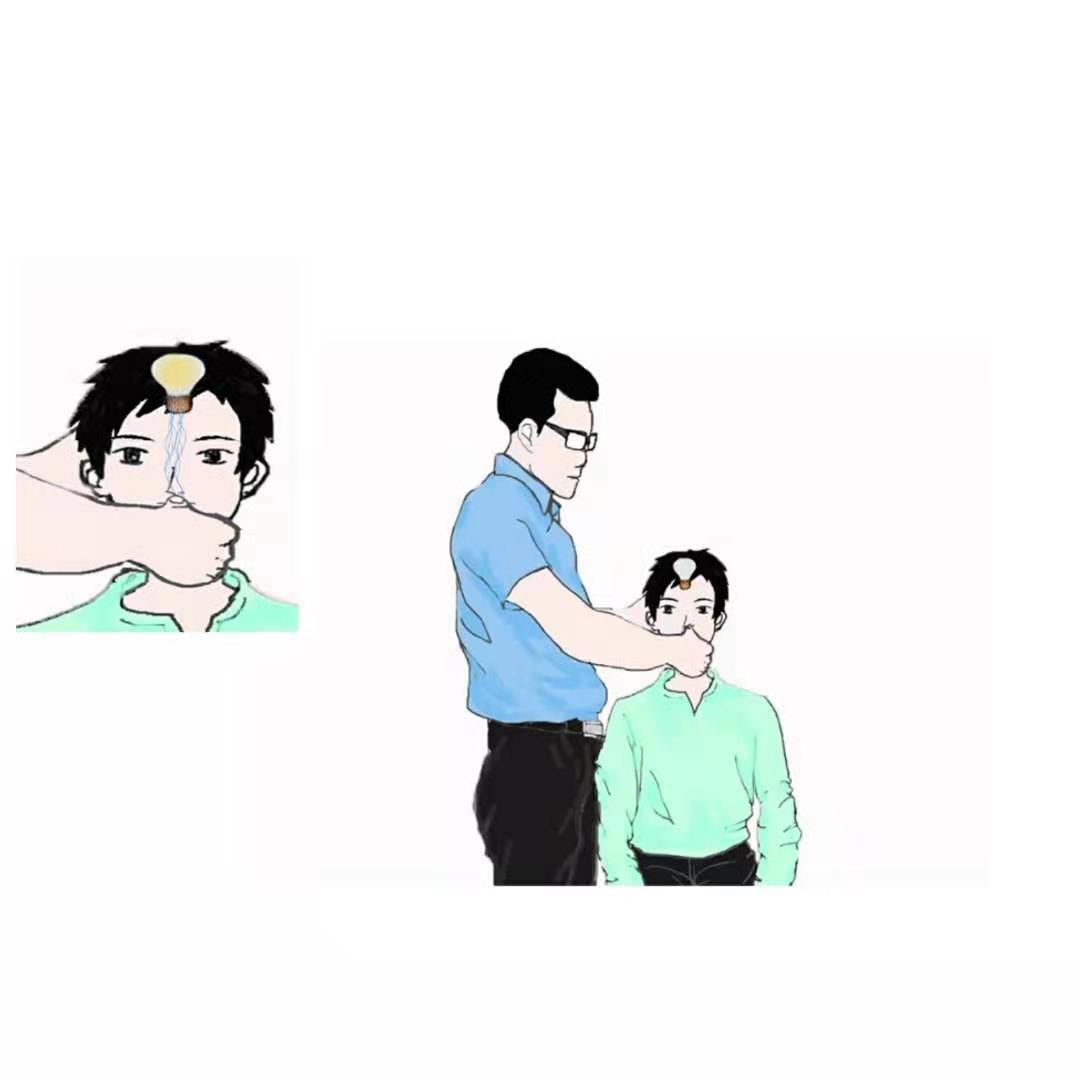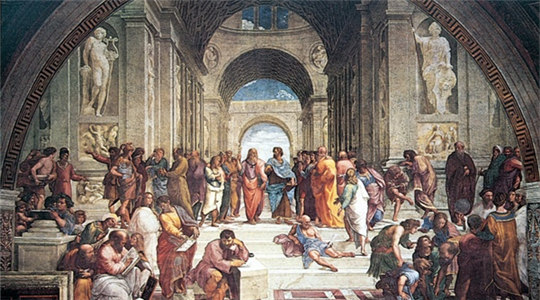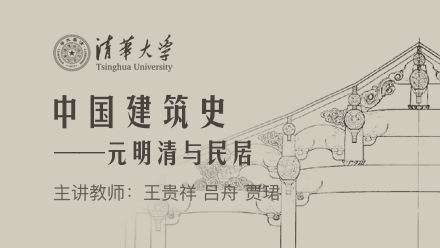
当前课程知识点:Plato, Socrates, and the Birth of Western Philosophy > Seeking “zhen”(真)——Methodology & Logic > 5.Aristotle’s Logics(judging true)(1) > Aristotle’s Logics(judging true)(1)
返回《Plato, Socrates, and the Birth of Western Philosophy》慕课在线视频课程列表
返回《Plato, Socrates, and the Birth of Western Philosophy》慕课在线视频列表
下面我给大家讲第三个问题
亚里士多德的逻辑学
有学者这么评价
说亚里士多德的哲学
几乎囊括了那个时代的一些知识领域
并且他掌握了各种知识的
早期发展线索
同时对这些线索
进行了深思熟虑的详细阐述
他对每个知识领域都有同样的兴趣
并给与了同样的理智上的评价
所以从知识的发展地角度来看
亚里士多德比柏拉图
更加全面地满足了知识发展的需要
哲学发展到今天
也已经成了一个庞大的门类
我们刚才说
亚里士多德是逻辑学的创始人
逻辑学也是一个哲学的部门
在现今我们国家这个哲学的学科中间
逻辑学与其他七个学科并肩而立
在一个标准的哲学系里头
我们一般认为
有三个基本的学科
一个是中国哲学
另一个是外国哲学
还有一个是马克思主义哲学
其他的几个学科分别是
伦理学 逻辑学 美学
我们先来看
亚里士多德是怎样创立逻辑学的
亚里士多德的逻辑学著作
总称工具论
它是由七篇论文组成的
这些论文的名称是
范畴篇 解释篇 前分析篇
后分析篇 论题篇 辩谬篇
从这些篇名来看
他所使用的一些概念
在现今逻辑学中间
都仍旧在大量的使用
我们说希腊哲学诞生在公元前6世纪
而亚里士多德
是公元前4世纪时候的人
所以哲学发展到亚里士多德这里
希腊这些的历程已经走过了两个世纪
那么为什么亚里士多德之前的哲学家
没有创立逻辑学
而这个任务
却要由亚里士多德来完成呢
我想看了希腊哲学从诞生一直发展到
亚里士多德这里的这么一个过程
我们可以认为
亚里士多德逻辑学的建立
是希腊哲学
尤其是希腊古典时期的哲学
自觉地去反思人的理性思维的成果
亚里士多德逻辑学的建立
它标志着希腊科学理性精神的升华
它也为以后
西方哲学的分析理性的趋势
奠定了一个基础
我们再来看逻辑学这个名称
逻辑学是哲学的一个组成部分
形式逻辑
它是以有效推理为核心内容
研究正确的思维形式
和思维规律的一门学问
逻辑学的亚里士多德创立的
但是 他本人
没有把它创立的这部分理论
这部分学问称作逻辑学
逻辑这个词 在希腊语中间
写作λογιχή
这个词源于希腊词λόγος
亚里士多德
没有给他自己创立的这门理论
命名为逻辑学
但是由于他在这个领域实际的贡献
所以我们在指出
逻辑学的创始人的时候
我们还是要认为
亚里士多德创立了逻辑学
亚里士多德在他的6部著作中间
他有的时候除了
λογιχή这个词
他没有用以外
他更多的使用的是另外一个
ἀνάλῠσις这个词
这个词的含义
是分析或者探索的方法
所以我们可以设想
由于亚里士多德逻辑学
的具体的著作里面
讨论推理的内容最多
讨论分析的方法的内容最多
所以要是让亚里士多德
自己来命名他创建的这部分理论
他可能会把它称作分析学
那么在希腊逻辑学的发展过程中间
谁先使用这个词的呢
这个是我们上一讲提到过的西塞罗
他最先使用了λογιχή这个词
来表示逻辑
西塞罗也撰写了许许多多的著作
但是他有许多著作
都是所谓的修辞学的著作
修辞和逻辑的关系非常密切
所以他在论至善与至恶这部书中间
这部讨论伦理学的著作中间
他也谈到了逻辑问题推理问题
这个时候他用的是λογιχή
所以我们可以说
创立逻辑学的是亚里士多德
给这门理论命名的是西塞罗
我们说西方人希腊人有逻辑思想
其他民族有没有呢
我们通过对中国古代的思想的研究
我们可以指出中国古代和近代
有逻辑思想也有逻辑学
只不过我们命名这种逻辑理论的时候
我们在命名这个学科的时候
用的是别的名称
中国古代有一种所谓的学问
叫做形名之学
或者叫做辩学 明理学
那么像这种学问
它实际上就是我们今天常说的
逻辑学的学问和理论
到了近代 中国学者严复
在翻译穆勒名学的时候
他首先使用了逻辑这个译名
后来逻辑学这个译名
到了20世纪
在中国学界就广泛地流通
从亚里士多德创立逻辑学以来
逻辑学这门学问一直发展到今天
发展到当代
它本身也已经形成了一个庞大的学科
它里面也有许多分支学科
亚里士多德逻辑学的内容十分丰富
我今天不太可能
详详细细地给大家介绍具体的内容
但是我想由于逻辑学
是哲学的一个重要组成部分
所以我们同学们
可以深入地去思考一下
哲学和逻辑学之间的关系
这个问题是当代的西方哲学家
都曾经深入地思考的问题
亚里士多德创立了逻辑学以后
逻辑学作为哲学的一个组成部分
也作为一个具有相对独立地位的学科
在后来的西方学术界
一直得到了人们的重视和发展
关于亚里士多德的逻辑学
我就简单地介绍到这
古希腊哲学在方法论
逻辑学领域的进展和成就
在我看来它是希腊民族
求真精神的最佳体现
-1.Etymology
-2.Definition and the History of Philosophy
--Definition and the History of Philosophy
-3.Religion
--Religion
-4.Culture
--Culture
-5.Theory of Cultural Transformation and Interaction: Five theoretical premise
--Theory of Cultural Transformation and Interaction: Five theoretical premise
-6.Theory of Cultural Transformation and Interaction:Five Basic Position
--Theory of Cultural Transformation and Interaction:Five Basic Position
-7.The Significance of Theory of Cultural Transformation and Interaction
--The Significance of Theory of Cultural Transformation and Interaction
-Self-test Exercises
-Thinking Questions
-1.The Birth Environment of the Greek Philosophy(1)
--The Birth Environment of the Greek Philosophy(1)
-2.The Birth Environment of Greek Philosophy(2)
--The Birth Environment of Greek Philosophy(2)
-3.The Stages and Schools of Greek Philosophy(1)
--The Stages and Schools of Greek Philosophy(1)
-4.The Stages and Schools of Greek Philosophy(2)
--The Stages and Schools of Greek Philosophy(2)
-5.The Local Characteristics of Ancient Greek Philosophy and the progress of internationalization(1)
--The Local Characteristics of Ancient Greek Philosophy and the progress of internationalization(1)
-6.The Local Characteristics of Ancient Greek Philosophy and the progress of internationalization(1)
--The Local Characteristics of Ancient Greek Philosophy and the progress of internationalization(1)
-7.The termination of Ancient Greek Philosophy
--The termination of Ancient Greek Philosophy
-Self-test Excercises
-Thinking Questions
-1.A transition to rational thinking(1)
--A transition to rational thinking(1)
-2.A transition to rational thinking(2)
--A transition to rational thinking(2)
-3.A transition to rational thinking(3)
--A transition to rational thinking(3)
-4.A transition to rational thinking(4)
--A transition to rational thinking(4)
-5.Heraclitus’ thinking
-6.Parmenides’ thinking(1)
-7.Parmenides’ thinking(2)
-Self-test Excercises
-Thinking Questions
-1.Seeking the origin:the early philosophers(1)
--Seeking the origin:the early philosophers(1)
-2.Seeking the origin:the early philosophers(2)
--Seeking the origin:the early philosophers(2)
-3.Seeking the essence: Plato’s theory of Form (1)
--Seeking the essence: Plato’s theory of Form (1)
-4.Seeking the essence: Plato’s theory of Form (2)
--Seeking the essence: Plato’s theory of Form (2)
-5.Seeking to on: Aristotle’s ontology and metaphysics (1)
--Seeking to on: Aristotle’s ontology and metaphysics (1)
-6.Seeking to on: Aristotle’s ontology and metaphysics (2)
--Seeking to on: Aristotle’s ontology and metaphysics (2)
-Self-test Excercises
-Thinking Questions
-1.The lexical meaning
-2.Epistemology(1)
-3.Epistemology(2)
-4.Epistemology(3)
-5.Epistemology(4)
-6.The features
-Self-test Excercises
-Thinking Questions
-1.A lexical meaning(1)
-2.A lexical meaning(2)
-3.A lexical meaning(3)
-4.Plato’s Dialectics(authentic true)
--Plato’s Dialectics(authentic true)
-5.Aristotle’s Logics(judging true)(1)
--Aristotle’s Logics(judging true)(1)
-6.Aristotle’s Logics(judging true)(2)
--Aristotle’s Logics(judging true)(2)
-Self-test Excercises
-Thinking Questions
-1.A lexical meaning
-2.The occurrence and development of the ancient Greek Science(1)
--The occurrence and development of the ancient Greek Science(1)
-3.The occurrence and development of the ancient Greek Science(2)
--The occurrence and development of the ancient Greek Science(2)
-4.The occurrence and development of the ancient Greek Science(3)
--The occurrence and development of the ancient Greek Science(3)
-5.The occurrence and development of the ancient Greek Science(4)
--The occurrence and development of the ancient Greek Science(4)
-6.The occurrence and development of the ancient Greek Science(5)
--The occurrence and development of the ancient Greek Science(5)
-7.the technicalization and application of ancient Greek Science(1)
--the technicalization and application of ancient Greek Science(1)
-8.the technicalization and application of ancient Greek Science(2)
--the technicalization and application of ancient Greek Science(2)
-Self-test Excercises
-Thinking Questions
-1.A Lexical meaning
-2.Plato’s theory of Love
-3.The high praise to the love god: a reading on Symposium (1)
--The high praise to the love god: a reading on Symposium (1)
-4.The high praise to the love god: a reading on Symposium (2)
--The high praise to the love god: a reading on Symposium (2)
-5.The high praise to the love god: a reading on Symposium (3)
--The high praise to the love god: a reading on Symposium (3)
-6.The high praise to the love god: a reading on Symposium (4)
--The high praise to the love god: a reading on Symposium (4)
-Self-test Excercises
-Thinking Questions
-1.A lexical analysis
-2.The development of the Classic Greek Ethics(1)
--The development of the Classic Greek Ethics(1)
-3.The development of the Classic Greek Ethics(2)
--The development of the Classic Greek Ethics(2)
-4.The development of the Classic Greek Ethics(3)
--The development of the Classic Greek Ethics(3)
-5.The development of the Classic Greek Ethics(4)
--The development of the Classic Greek Ethics(4)
-6.From the ultimate goodness to the common goodness(1)
--VideoFrom the ultimate goodness to the common goodness(1)
-7.From the ultimate goodness to the common goodness(2)
--From the ultimate goodness to the common goodness(2)
-Self-test Excercises
-Thinking Questions
-1.A lexical meaning
-2.Ancient humanistic trend of thoughts(1)
--Ancient humanistic trend of thoughts(1)
-3.Ancient humanistic trend of thoughts(2)
--Ancient humanistic trend of thoughts(2)
-4.Ancient humanistic trend of thoughts(3)
--Ancient humanistic trend of thoughts(3)
-5.A theoretical summary
-Self-test Excercises
-Thinking Questions
-1.A lexical analysis
-2.The story of Gyges
-3.The Ancient theory of justice(1)
--The Ancient theory of justice(1)
-4.The Ancient theory of justice(2)
--The Ancient theory of justice(2)
-4.The Ancient theory of justice(3)
--The Ancient theory of justice(3)
-Self-test Excercises
-Thinking Questions
-1.An explanation to the related words
--An explanation to the related words
-2.A Platonic Republic
-3.Cicero’s people’s Republic(1)
--Cicero’s people’s Republic(1)
-4.Cicero’s people’s Republic(2)
--Cicero’s people’s Republic(2)
-Self-test Excercises
-Thinking Questions
-1.A lexical analysis
-2.The religious trends in the late period of ancient Greek philosophy(1)
--The religious trends in the late period of ancient Greek philosophy(1)
-3.The religious trends in the late period of ancient Greek philosophy(2)
--The religious trends in the late period of ancient Greek philosophy(2)
-4.The religious trends in the late period of ancient Greek philosophy(3)
--The religious trends in the late period of ancient Greek philosophy(3)
-5.The religious trends in the late period of ancient Greek philosophy(4)
--The religious trends in the late period of ancient Greek philosophy(4)
-6.The collision between faith and reason(1)
--The collision between faith and reason(1)
-7.The collision between faith and reason(2)
--The collision between faith and reason(2)
-Self-test Excercises
-Thinking Questions
-1.An explanation to the related words
--An explanation to the related words
-2.Communion with gods(1)
-3.Communion with gods(2)
-4.Communion with gods(3)
-5.Communion with gods(4)
-6.Plotinus’ mystical system of thoughts
--Plotinus’ mystical system of thoughts
-Self-test Excercises
-Thinking Questions
-1.The local characteristics of the ancient Greek Philosophy
--The local characteristics of the ancient Greek Philosophy
-2.The progressive universalization of the ancient Greek Philosophy
--The progressive universalization of the ancient Greek Philosophy
-3.The basic spirits of the ancient Greek Philosophy(1)
--The basic spirits of the ancient Greek Philosophy(1)
-4.The basic spirits of the ancient Greek Philosophy(2)
--The basic spirits of the ancient Greek Philosophy(2)
-Self-test Excercises
-Thinking Questions




